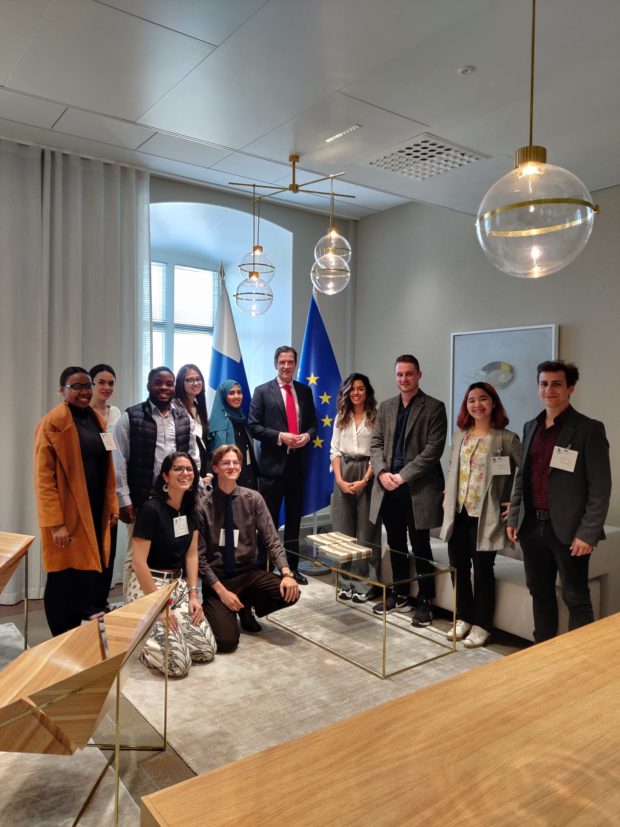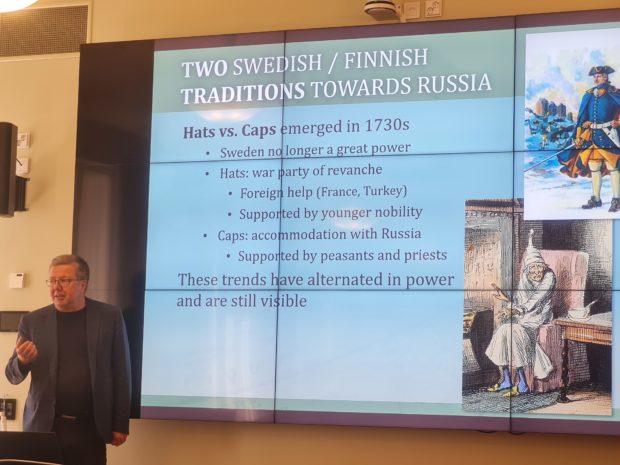Nato aspirant Finland ‘ready for whatever Russians will throw at us’

GLOBAL VIEW Journalists from 13 countries took part in this year’s Finland Foreign Correspondents Program, including the author (second from right).
HELSINKI—With Finland’s bid for membership in the North Atlantic Treaty Organization (Nato) now one step closer to reality, its top officials and policy experts expressed confidence that it would be able to fend off any act of aggression that may come from Russia, which has strongly opposed its accession to the Western security alliance.
Speaking to foreign journalists taking part in the annual Finland Correspondents Programme earlier this month, Janne Kuusela, director general for defense policy of the Finnish ministry of defense, conceded that “the calculus (of gauging Russia’s plans) is a bit more difficult but we can strengthen our defense.”
“We are not worried, we are not afraid, but there is a big risk involved. They will try to influence us in some ways,” Kuusela said. “[But] we can deal with whatever the Russians will throw at us.”
“It can be nasty, bloody, but we will survive it,” he added.
Buildup on 2 fronts
Since the Russian invasion of Ukraine in late February, Finland—which shares a 1,340-kilometer eastern border with its giant neighbor—has started shoring up its military and cybersecurity fronts.
Article continues after this advertisementIn particular, Helsinki is confident about its cyberstrategy, an area that, according to Undersecretary of State Kai Sauer, Russia had exploited in Ukraine.
Article continues after this advertisement“For the foreseeable future, there would be more for defense,” said Kuusela. “But we hope we would never have to use it.”
Finland and neigboring Sweden—countries with long histories of strategic neutrality—applied for Nato membership shortly after Russia launched its invasion of Ukraine on Feb. 24.
Wary of Nato expansion, Moscow had opposed Ukraine’s desire to join the security bloc and warned the two Nordic countries against doing the same.
Initially, Nato member Turkey also opposed the application of Finland and Sweden.
But last week, its president, Recep Tayyip Erdogan, finally dropped its objection and signed a trilateral deal with the Nordic states.

HATS VS CAPS Professor Kimmo Rentola of the University of Helsinki discusses Finland’s decadeslong nonalignment policy.
Public opinion
Finland’s decision to join Nato did not come easy. Since gaining independence from what was then the Soviet Union in December 1917, Finland had maintained a delicate balancing act in its foreign policy—to keep its “head down but act swiftly when crisis comes,” said Kimmo Rentola, a political history professor at the University of Helsinki.
For decades, the Finnish people held the view that there was no need to join Nato since they saw their country as a “security provider rather than a seeker,” said Dr. Iro Sarkka, also of the University of Helsinki.
But “that changed after (Russia President Vladimir) Putin became a Nato member hunter,” Rentola said. “In practice, Putin actually decided for Finland and Sweden to ditch neutrality.”
After the invasion of Ukraine, Finnish support for Nato membership soared to 80 percent in an opinion poll—a historic high that also showed in the solid parliamentary backing for the application, Sauer said.
Ready to fight
Even more impressive, he said, was the survey result showing that 81 percent of the Finnish people were “ready to take up arms to defend Finland and to participate in collective defense.”
Ukraine drove this dramatic shift in public opinion, Sauer said, and it’s unlikely for Finland to walk back its Nato application even if Moscow would somehow stop or temper its actions against Kyiv.
“This is a generational experience,” Sauer said. ‘’The political trust is very much in favor of the parties and coalitions (that voted for the Nato application).”
Still, the “changes are happening so rapidly that it would take Finland time to craft a Nato policy,” explained Matti Pesu, researcher from the Finnish Institute of International Affairs.
Once a member of the alliance, Finland expected to advocate, among others, a more ambitious strategy for the defense of the European Union, Pesu said.
(The Inquirer was the only Southeast Asian media outfit in this year’s Finland Correspondents Programme, which also included journalists from the United States, France, Angola, the United Kingdom, Australia, Turkey, Israel, Poland, Hungary, Tanzania, Uzbekistan and Chile.)